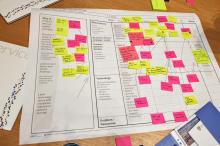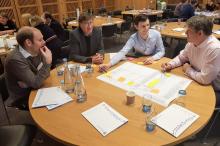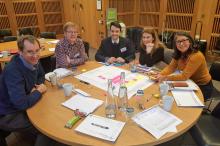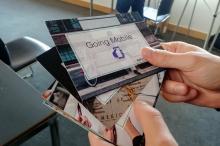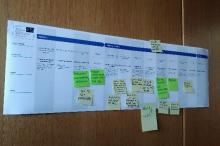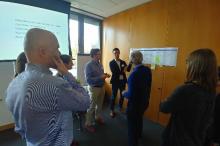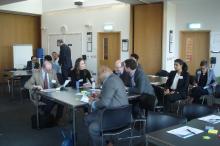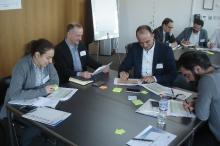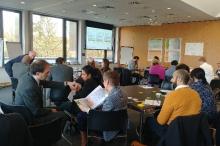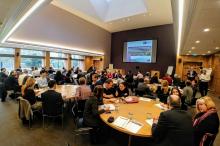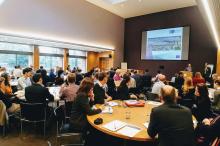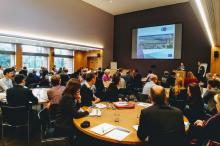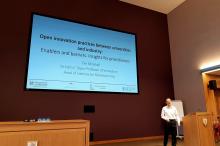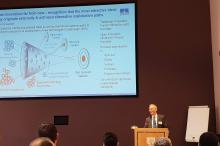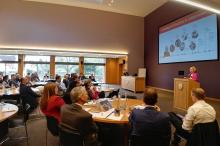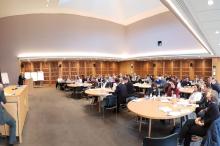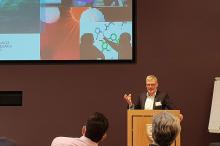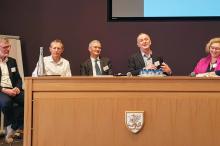- Wednesday 13 February 2019
- Cambridge, UK
- Organiser:
Final Event
About this Event
Around 100 participants from across the globe got together in Cambridge for the Future of Open Innovation Practices Day on February 13th 2019.
Hosted by Science2Society, this full day of interactive workshops and talks showed tangible mechanisms for facilitating stakeholder interaction to ensure science’s impact on society and the markets.
Valuable insights from both Academia and Industry were presented, with keynote speeches from Professor of Innovation at the University of Cambridge and Head of the Institute for Manufacturing (IfM), Dr. Tim Minshall, RICARDO's Chief Technology and Innovation Officer, Prof. Neville Jackson, Head of Hit Discovery at AstraZeneca, Dr. Garry Pairaudeau and Dr. Marta Piñeiro-Núñez, Senior Advisor to Lilly Research Laboratories (LRL) leadership in Indianapolis, USA.
The event was the culmination of EC funded project Science2Society, researching the future of interaction between universities, industries and broader society as a whole. Science2Society is one of the very few projects that explore the future of innovation ecosystem interaction mechanisms, particularly borrowing best practices from Internet 2.0 and 3.0 platforms and communities.
The consortium also shared their key findings and recommendations to support the ongoing innovation learning process and was delighted with the positive feedback from attendees, including many open innovation experts.
If you would like to find out more about the event
Event Review
Keynote speeches
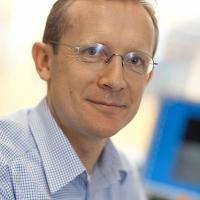
Dr. Tim Minshall (University of Cambridge)
Professor of Innovation and Head of the Institute for Manufacturing at University of Cambridge. His research, teaching and engagement activities are focused on the links between manufacturing and innovation. He works closely with companies in the Cambridge cluster, the largest and most successful technology cluster in Europe.
Dr Tim Minshall kicked off the morning of keynotes with a summary of the evolution of innovation, main internal challenges and common misconceptions.
The presentation covers:
- Definition of Innovation and Open Innovation
- Practical challenges of implementing open innovation, with particular focus on people and culture, and on universities and start-ups collaborating with large companies.
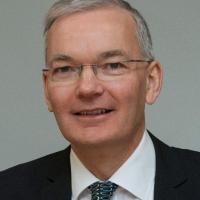
Prof. Neville Jackson (Ricardo)
Chief Technology and Innovation Officer at Ricardo. He is responsible for the future vision for transport & energy technologies at Ricardo and the associated roadmaps and research agenda to deliver this vision. He is a Fellow of the UK Royal Academy of Engineering, a Fellow of the US SAE and has produced over 140 technical papers, keynote presentations or invited lectures in the US, Europe and Asia.
Keynote: “Innovation – Theory & Practice at Ricardo plc” (Interested in the presentation? Please send your request to science2society@i2m.at)
One of the main themes of his keynote was the importance to have an efficient ecosystem to connect market knowledge with ideas: “Open Innovation is a powerful tool in the right settings, when there is balance between ideas, market access and product life”
The presentation covers:
- Innovation process and the experience at Ricardo
- Role for open innovation and where this can be applied
- Ricardo´s experience with crowdsourcing and related challenges & issues

Dr. Marta Piñeiro-Núñez (Lilly Research Laboratories, LRL)
Senior Advisor to Lilly Research Laboratories (LRL) leadership in Indianapolis, USA. With over 20 years of experience in the pharmaceutical industry, first as a medicinal chemist in drug discovery projects and later in strategic/management positions, Marta has led a variety of efforts to operate today’s pharmaceutical R&D business, as well as to design and execute business models representing its future state.
Keynote: “Open Innovation: A Reflection on Lilly’s Experiences 2000-2019”
One of the main themes of her keynote was the importance of trust and alliance management principles for successful open innovation partnerships: “we must focus on relational, not transactional partnerships.”
The presentation covers:
- Lilly Corporate overview, focus on collaboration and values
- Open Innovation in Pharma: challenges & barriers
- Open Innovation Drug Discovery at Lilly
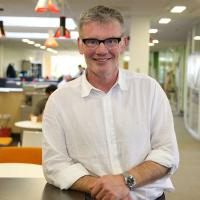
Dr. Garry Pairaudeau (AstraZeneca)
Head of Hit Discovery at AstraZeneca. The group is responsible for generating high quality starting points for AstraZeneca. In addition, the group works extensively with academic centres of excellence through open innovation and strategic collaborations to support academic drug discovery.
Keynote: “Learnings from AstraZeneca’s Open Innovation Program” (presentation available here)
Dr. Garry Pairaudeau spoke of his success with opening up his non-core research results to facilitate further collaborative research: “Don´t try to manage Innovation, that will be a disaster, try rather to focus what idea you really want to test for further development”
The presentation covers:
- Innovation process and OI experience at AstraZeneca
- Target Innovation and open ecosystem
- Biggest barriers to success in innovation
Interactive workshops
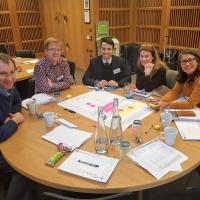
Workshop 1. Roadmapping for Strategic Planning
Organizer(s): Nicky Athanassopoulou (IfM-ECS)
This hands-on workshop guided the participants through a roadmapping template, showing how it can help individual or different organisations align technological and commercial objectives, as well as detailing our fast-start, resource-efficient approaches to developing roadmaps.
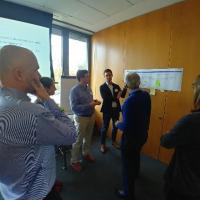
Workshop 2. How to smoothen the journey for all stakeholders involved in creating university spin-offs
Organizer(s): Laszlo Bax and Maarten Buysse (Bax & Company)
The focus of this hands-on workshop was “how to smoothen the journey towards creating a university spin-off”. By immersing the participants in the process of university spin-off creation and discussing stakeholder personas and user journeys, the pains and gains of all involved stakeholders was detected. Inspired by relevant megatrends in this field, an ideation session then focused on solutions for the detected pains and ideas to exploit the discovered gains.
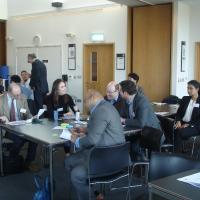
Workshop 3. Digitalisation - Prioritising & Selecting the Best Innovative Opportunities
Organizer(s): Duncan Hurlstone (IfM-ECS), Aldo Ofenheimer (i2m)
This innovation focused workshop provided guidance on how to design a method for evaluating and selecting potential technology-based opportunities or projects, how to choose the evaluation factors that do not rely on financial considerations alone, how to ensure that the evaluation is as logical and objective, and how to include the inevitable uncertainty.
Participants feedback
final event feedback 2
The university spin-off creation workshop had a nice variety of people and it was interesting to hear the kinds of questions people have, particularly from outside the academic environment. (Vassilis Georgiadis, UCL Innovation & Enterprise.)
final event feedback 1
The event was even more helpful and informative than I expected. The technology roadmapping workshop inspired me to look further than I normally do. (Peter Tulloch, Transport for London)
final event feedback 3
The event was very useful to understand the Open Innovation landscape, the implications of performing Open Innovation and the view from practitioners. (Ricard Munne, ATOS.)
Picture gallery
Speakers
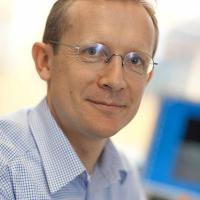
Tim Minshall
Dr John C Taylor Professor of Innovation and Head of the Institute for Manufacturing at University of Cambridge
Tim is the inaugural Dr John C Taylor Professor of Innovation at the University of Cambridge, Head of the Institute for Manufacturing (IfM) and Head of the IfM’s Centre for Technology Management (CTM). His research, teaching and engagement activities are focused on the links between manufacturing and innovation.
Since joining the University of Cambridge in 2002, Tim has played a very active role in the development of innovation and technology management activities across the University. He also works closely with companies in the Cambridge cluster, the largest and most successful technology cluster in Europe.
Tim was appointed as Head of the IfM in 2017 and is a member of the board of directors for IfM Education and Consultancy Services Ltd and St John’s Innovation Centre Ltd, a Visiting Research Fellow at the Institute of Technology, Enterprise and Competitiveness (ITEC) at Doshisha University in Japan, and a member of the IET's Innovation and Emerging Technologies Policy Panel.
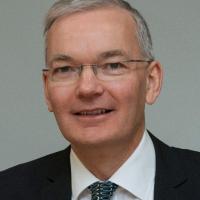
Neville Jackson
Chief Technology and Innovation Officer at RICARDO
Neville Jackson has been with Ricardo for thirty-six years and was appointed as Chief Technology and Innovation Officer in 2009. He is responsible for the future vision for transport & energy technologies at Ricardo and the associated roadmaps and research agenda to deliver this vision.
A visiting Professor at the University of Brighton since 2007, he Chairs both the UK Advanced Propulsion Centre Advisory Board, and the UK Automotive Council Future R&D Team. He also serves as Vice Chair of the European Road Transport Research Advisory Council (ERTRAC) and a member of the Industry Delegation for the European Green Vehicles Initiative (EGVI).
He is a Fellow of the UK Royal Academy of Engineering, a Fellow of the US SAE and has produced over 140 technical papers, keynote presentations or invited lectures in the US, Europe and Asia.

Dr. Marta Piñeiro-Núñez
Senior Advisor to Lilly Research Laboratories (LRL) leadership in Indianapolis, USA
Marta is currently Senior Advisor to Lilly Research Laboratories (LRL) leadership in Indianapolis, USA, focused on strategic transformation projects linked to LRL’s Next Generation Research agenda.
Her prior assignments included a stint as Chief of Staff for the Small Molecule Chemistry organisation, and a decade as Director/Executive Director for the Lilly Open Innovation Drug Discovery program.
With over 20 years of experience in the pharmaceutical industry, first as a medicinal chemist in drug discovery projects and later in strategic/management positions, Marta has led a variety of efforts to operate today’s pharmaceutical R&D business, as well as to design and execute business models representing its future state. Marta holds a PhD in organic chemistry from Indiana University and was an American Cancer Society Postdoctoral Fellow at Colorado State University.
Dr. Garry Pairaudeau
Head of Hit Discovery at AstraZeneca
Garry Pairaudeau is currently Head of Hit Discovery at AstraZeneca; the group comprising HTS, Comp Chem, Virtual screening and DEL is responsible for generating high quality starting points for AstraZeneca. In addition, the group works extensively with academic centres of excellence through open innovation and strategic collaborations with groups such as MRC, CRUK, Life Arc and many others to help support academic drug discovery.
Garry also chairs the Global Chemistry Leadership team in AstraZeneca responsible for chemistry strategy and has been particularly active in building Automation and Machine learning capabilities.
Garry obtained his PhD in chemistry from the University of Southampton in 1991, followed by post-doctoral work at UC Irvine California. He joined AstraZeneca in 1994 as a medicinal chemist and was part of the chemistry team that discovered Brilinta. He has experience leading projects through all phases of Drug Discovery contributing to multiple clinical candidates in the respiratory, inflammation and CV areas.
Agenda
-
09.30
Welcome -
09.40
Opening session -
09.50
Prof Tim Minshall, University of Cambridge -
10.20
Prof Neville Jackson, Ricardo -
10.50
Dr Marta Piñeiro-Núñez, Lilly Research Laboratories (LRL) -
11.20
Refreshments -
11.45
Dr Garry Pairaudeau, AstraZeneca -
12.15
Plenary round table discussion -
13.00
Lunch -
14.00
Science2Society results (enablers, barriers and policy implications) -
14.45
3 parallel workshops on toolkits- Roadmapping for Strategic Planning
- How to smoothen the journey for all stakeholders involved in creating university spin-offs
- Digitalisation - Prioritising and Selecting the Best Innovative Opportunities
16.30
Closing remarks17.00
Close

- CountryBelgium
- WebsiteLink
- AcronymKUL
The Katholieke Universiteit Leuven, being the 6th European university in the 2008 Leiden bibliometric ranking, participates in over 540 FP7 projects, ranking sixth in the league of HES institutions participating. KU Leuven takes up the 8th place of European institutions hosting ERC grants. To date, the 69 ERC Grantees in its midst confirm that KU Leuven is a breeding ground (49 Starting Grants) and attractive destination for the world’s best researchers. The success in the FP7 Marie Curie Actions is a manifestation of the three pillars of KU Leuven: research, education and service to society. In its 136 Actions, of which 53 Initial Training Networks, hundreds of young researchers have been trained through research and have acquired the necessary skills to transfer their knowledge into the world outside academia. KU Leuven has 41255 students and a staff of 9848, with 14 faculties covering all disciplines in humanities, life sciences, physical sciences & engineering. Applied research is supported by the well-experienced KU Leuven Research & Development (LRD), one of the most renowned technology transfer offices in Europe. In Science2Society KU Leuven will be participating with its Noise and Vibration Research Group which currently counts 74 researchers and is part of the Mechanical Engineering Department, a vibrant environment of close to 250 researchers. Doctoral training is provided in the framework of the Leuven Arenberg Doctoral School. The research group has extensive experience in industry-academia research and training cooperation via staff exchange, dual-desk PhD’s, industrial PhD’s and other schemes, and has been using tools for the implementation of the above such as the Marie Sklodowska Curie Actions Innovative Training Networks (ITN), European Industry Doctorates (EID) and Industry-Academia Partnerships and Pathways (IAPP).

- CountryGermany
- WebsiteLink
- AcronymKIT-IPEK
IPEK is a research facility at the Karlsruhe Institute of Technology (KIT) and see itself as a center for scientific product development and innovation with a focus on drive systems and mobility. IPEK is committed to research and advancement of methods and processes of product development, their evaluation on real systems and communicating them outstanding well in teaching and further education. IPEK aims to be one of the world's leading university Institutes in this regard. As a highly motivated and performance-oriented team, the aim of its daily work is to contribute to scientific knowledge and to strengthen the competitiveness of the German economy. IPEK succeeds in this through education and further training of students and graduates, and through its research activities and continuous transfer of knowledge into industry. IPEK lives by the methods and processes that IPEK researches and teaches. IPEK wishes to attract the brightest minds into its team. The foundation of its collaboration is self-imposed commitment to performance, tolerance and mutual support, based on trust. IPEK gives its assurance that it will follow the German Research Foundation's rules of good scientific practice at all times.
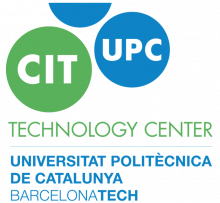
- CountrySpain
- WebsiteLink
- AcronymCIT UPC
The Universitat Politècnica de Catalunya (UPC) is a public institution dedicated to research and higher education, specialized in the fields of architecture, science and engineering. Every year over 31,000 undergraduate and master's degree students and nearly 3,000 doctoral students enrol at the UPC. With a high degree of mobility among its students, the UPC is one of the European universities that receives the greatest number of international students; in fact, it has the highest intake of international master's and doctoral degree students in Spain. The UPC is also the European university with the highest number of Erasmus Mundus programs: thirteen master's degree courses and five doctoral programs. The UPC’s leadership is attested to by the latest university rankings: it is the top Spanish university in engineering and technology in the latest QS World University Ranking and in engineering (2002-2011) and architecture (2007-2011) in the I-UGR Ranking. According to the SCIMAGO Ranking 2013, it is the top technical University in Southern Europe. The UPC has a long track-record of collaboration with companies, increasing their competitiveness and capacity for innovation and working to promote research transfer and valorisation. In 2011, the UPC’s related turnover was € 78,3 million, one third coming from agreements with companies and institutions, one third from national calls for proposals and programs and another third from European programs. Regarding international research collaborative projects, the UPC is a major player in the Seventh Framework Programme (FP7), where it participated in 151 FP7 projects (of which 35 coordinated) and has had a long track of successfully coordinated projects for many years. The UPC Technology Center (CIT UPC) is a non-profit entity, attached to the UPC, but with its own legal personality. It is dedicated to applying university research capabilities to innovation in business. The mission of CIT UPC is to promote economic and social development and, in particular, to improve business competitiveness by generating technological knowledge and carrying out and applying R&D activities. CIT UPC comprises 20 UPC Research Centers, accounting for 532 researchers (55% of them PhD) and a total income of €12 million. CIT UPC furthers the goals of the UPC by fostering research and innovation, while helping to bring new developments to the wider world and providing scientific and technological services to companies.

- CountryUnited Kingdom
- WebsiteLink
- AcronymIfM ECS
IfM Education and Consultancy Services Limited (IfM ECS) is a wholly owned subsidiary of the University of Cambridge. The Company conducts the commercial activities of the Institute for Manufacturing (IfM). IfM ECS provides a rapid knowledge dissemination route for new ideas, research and methodologies developed at the IfM. Since its inception, IfM ECS has worked with over 1,000 organizations internationally, (start-ups, SMEs, large multinationals and governments) to disseminate knowledge. Industrial practitioners engage directly with industry, governments and agencies via consultancy, executive education and events. Our approach is very different to conventional consultancy, involving working collaboratively to co-develop solutions, based on IfM research outputs, and focusing on transferring knowledge as well as delivering business results. These engagements help to both inform and fund future IfM research.

- Country
- WebsiteLink
- AcronymAALTO
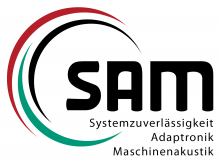
- CountryGermany
- WebsiteLink
- AcronymTUDa

- CountryAustria
- WebsiteLink
- AcronymViF
With its 200 employees, Virtual Vehicle is a leading and experienced international acting RTO in the field of applicationoriented vehicle development and future vehicle concepts for road and rail. More than a hundred national and international research projects in close collaborations with leading partners from industry and academia of various sectors (also from aerospace, building etc.) from all over the world have been conducted since 2002 at Virtual Vehicle. As the main shareholder the Graz University of Technology (TUG) connects Virtual Vehicle to more than 40 institutes enabling technical innovations in virtual vehicle development. Virtual Vehicle is a proactive member in various technology platforms/associations such as the European Automotive Research Partners Association EARPA, the European Green Vehicle Initiative Association EGVIA and JTIs like ARTEMIS/ Ecsel - showing its strategic position in the global research environment and its well-orchestrated networks channels with global reach. In the light of the above Virtual Vehicle will offer valuable input (profound real-life experience and sound knowledge) to both define relevant guidelines and ensure high impact of results of the Sience2society project.

- CountryGermany
- WebsiteLink
- AcronymLBF
The Fraunhofer LBF looks back on 75 years of experience in the field of structural durability and nowadays expanded with the expertise in adaptronics, plastics and system reliability. The Fraunhofer LBF develops, evaluates and realizes customized solutions for safety relevant products with a team of more than 450 employees together with the associated Chair of System Reliability and Machine Acoustics SzM and Chair of Macromolecular Chemistry of the TU Darmstadt. In doing so, the full added value chain is considered, from the idea to the product, from the material to the system and over the full life-cycle. For the customized solutions, the LBF provides versatile test facilities on more than 17.000 m2 which are complemented by the Virtual Test Lab for numerical simulations and testing. Since 1 July 2012, the German Institute for Polymers (DKI) became a division of Fraunhofer LBF. Thus, the competences of the Fraunhofer LBF have been extended by synthesis, processing, analysis and testing of functional and engineering plastics. The Fraunhofer LBF is currently structured into the four divisions Structural Durability, Smart Structures, Plastics and System Reliability. The Fraunhofer LBF is participating in alliances and networks inside and outside the Fraunhofer Gesellschaft and performs research together with its partners on behalf of the industry, the trade associations, federal ministries, German Research Society and the European Union. The Fraunhofer LBF is e.g. member of the European Automotive Research Partners Association EARPA, the European Road Transport Research Advisory Council ERTRAC, the European Green Vehicle Initiative Association EGVIA and the European Technology Platform on Smart System Integration EPoSS. The Fraunhofer LBF is accredited as test facility according to DIN EN ISO-IEC 17025 and uses a certified quality management system according to DIN EN ISO 9001:2000.
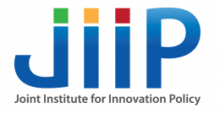
- CountryBelgium
- WebsiteLink
- AcronymJIIP
The Joint Institute for Innovation Policy (JIIP) is a joint venture of four well-renowned Research and Technology Organisations (RTOs) from four different European countries: TNO (The Netherlands), VTT (Finland), Joanneum Research (Austria) and Tecnalia (Spain). It was established in April 2008 on the basis of a consortium agreement and became a legal entity in May 2012. JIIP provides intelligence to support policy-making with a focus on research and innovation policy. One of the competitive strengths of the partnership lies in the interdisciplinary nature of its mother institutes and the subsequent cross-over and added value for the services JIIP can offer and deliver. The partnership involves a core pool of around 170 researchers in relevant units of the four partner organisations. A central office located in Brussels coordinates the joint activities and steers the further strategic development of the partnerships. The core competences and services lie in the following areas:
- Policy analysis : evaluation of policy initiatives and programmes; impact assessments; policy monitoring; policy development;
- Analysis of innovation dynamics and systems : sectoral innovation dynamics; national/regional innovation systems;
- innovation-related economic analyses;
- Forward-looking activities : foresight; forecast; technology assessment; horizon scanning;
- Data and indicators : data collection; data analysis; and research on indicators.

- CountryAustria
- WebsiteLink
- Acronymi2m
The technology, business and organisation development consultancy i2m is headquartered in Graz (Austria) and focuses on the transport and building sector as well as on solutions for applications from the domains of mechanical engineering and “green technologies. i2m specializes in creating product, service and business model innovation to enable its clients to sharpen competitive advantage and to boost growth. i2m’s team is well set up to help its clients to innovate in products and services and to execute with its clients the multidimensional and orchestrated set of activities required for business model innovation. i2m’s strength lies in driving a collaborative approach with national and international partners from industry and academia for bringing together results from basic & applied research, outcomes of conceptual developments and piloting to create new products & services. Setting up the required organisational structures for boosting innovativeness is also one key strength of i2m.

- CountrySpain
- WebsiteLink
- AcronymB&W

- CountryAustria
- WebsiteLink
- AcronymSD
Spirit Design is a leading strategic design company headquartered in Vienna. Its team of 20 consultants and designers specialised in innovation and brands create sustainable solutions for customers in the mobility, IT, energy, industry and consumer sectors, offering a comprehensive range of services on three levels:
- Developing trend-setting visions in the form of clear innovation and brand strategies,
- Translating these visions into integrated product, service and brand developments through to market launch and
- Management support during all innovation, brand and design processes.
This holistic design approach benefits more than Spirit Design’s customer base. At the heart of the work performed lies a meaningful value proposition for consumers, society and the environment. In recent years the fields of expertise have extended from consulting and design on singular means of transport to the integrated design of mobility systems and vehicle development. The work revolves around the user and their needs: User Centred Development becomes key to successful product and service innovations.

- CountrySpain
- WebsiteLink
- AcronymINNOGET
Innovawin 2006 S.L. (hereinafter, Innoget) is an Open Innovation services provider with a clear focus on developing online solutions to enhance and foster collaboration in R&D, Business development and Innovation among Industry, Academia, Funding bodies and Society stakeholders. Defined as an Internet based company and headquartered in Mataró, Spain, Innoget was established in 2006 from the integration of a group of professionals of recognized standing and experience in the fields of Open Innovation and Technology Transfer. The co-founding partners have more than 30 years experience within Open Innovation management and assisting International companies, SMEs, Universities, Public and Private Research Organizations, Clusters, Economic promotion Agencies and Public bodies in building new and innovative Open Innovation capabilities. Innoget’s core business activity is developed through its Global online Open Innovation Marketplace, an innovative and proven way for selling and buying technologies and knowledge in a wide range of technical fields from Life Science, Engineering, Chemistry, Computer Science and Physics. Innoget.com is a global community comprised of thousands of professionals who have free access to tech calls and techs for sale posted by organizations convinced of the need to collaborate with external partners and actively seek to invest in joint development, technology acquisition, licensing or any other type of collaboration. Innoget offers connections with no services or brokers involved in two different directions, a “Market Pull” for larger companies and SMEs searching for R&D innovation, business and technical challenges to be solved, and a “Technology Push” where innovation consortia, universities, research based organizations, Start ups actively look for partners to either commercialize or invest in their technologies, knowledge, capabilities and innovate products. Innoget also launched a multiuser SaaS IT platform, the InnogetCloud, where customers can customise their own online Open Innovation marketplaces as well, and clearly important, automatically connect them to www.innoget.com, that acts as a “hub” among all of them.

- CountryBelgium
- WebsiteLink
- AcronymCOG
CogniStreamer is a Belgian SME with headquarters in Flanders, and sales offices in US and India. We offer collaborative software and professional services to drive and manage corporate open innovation:
- Software tools for ideation and enrichment, crowdsourcing new products and services, knowledge management and patent management.
- Professional services to imbed continuous and sustainable collaborative innovation programs, helping companies in connecting employees, cross-silo and cross-company, and drive the innovation process.
CogniStreamer has over 40 global clients from different business domains such as industrial manufacturing, chemicals, telecommunications, banking, utilities and consumer goods.
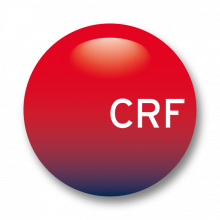
- CountryItaly
- WebsiteLink
- AcronymCRF
Centro Ricerche Fiat (CRF), founded in 1978, has the mission to develop and transfer innovative products, processes and methodologies in order to improve the competitiveness of the products of FCA (Fiat-Chrylser Automobiles). Through cooperation with a pan-European and increasingly global network of more than 1800 partners from industry and academia, CRF conducts collaborative research initiatives at the national and international levels in partnership with all the key public and private stakeholders concerned with sustainable mobility, targeting specifically the industrial exploitation of research. With a workforce of approximately 900 full-time professionals, CRF develops research and innovation along the three principal axes of sustainability: Environmental Sustainability, which encompasses all aspects relating to energy efficiency as well as to the reduction of the impact on the environment over the entire lifecycle of the vehicle; Social Sustainability, focusing on the safety of transportation systems through the development of active, passive, preventive and cooperative solutions while addressing the mobility of all users irrespective of their specific needs; Economically sustainable competitiveness, oriented towards viable innovation, i.e., improving the performance and functionality of new vehicles in a cost-effective manner while reducing the time-to-market of research results. The CRF research activities imply strategic competences not only in the field of automotive engineering, but also in the fields of manufacturing, advanced materials, ICT and electronics, as well as a wide range of state-of-the-art laboratories and extensive test facilities, including advanced engine & vehicle testing facilities, EMC chambers and a dynamic driving simulator with immersive virtual reality. CRF participates with a leading role in the European “Green Vehicle Initiative” and “Factories of the Future”, the Public Private Partnerships which focus public and private research on issues of direct and significant relevance to the Europe with regard to the competitiveness of industry and employment. Within this context, CRF is actively involved in key European Technology Platforms including: ERTRAC (road transport), EPOSS (smart systems), EUMAT (materials), MANUFUTURE (manufacturing), bringing together key stakeholders within an integrated approach to research and innovation. CRF is also supporting the Joint Technology Initiative ECSEL (Electronic Components and Systems for European Leadership). The Intellectual Property developed by CRF includes over 2570 patents, both granted and pending, protecting over 590 inventions. In recent years the technology-driver role of CRF has enabled the industrialization and commercialization of a significant number of distinctive and highly innovative products for FCA including, in the powertrains area: the Diesel Common Rail system (UNIJET and MultiJet), the MULTIAIRÒ system with the TwinAir engine, CNG (Compressed Natural Gas) and DDCT (Dual Dry Clutch Transmission) technologies; and in the vehicles area: energy saving airconditioning systems, the Blue&MeTM connectivity product, Driving Advisor and Magic Parking driver-assistance systems and the ECODriveTM eco-navigation solutions.

- CountryBelgium
- WebsiteLink
- AcronymSISW
Siemens Industry Software NV (SISW LMS) is a Belgian company, constituting the Simulation and Test Solutions (STS) business segment within Siemens PLM Software. SISW originated as LMS International, a spin-off company from the KU Leuven, developing into a world-leading position for advanced engineering solutions for the mechanical and mechatronic industry. In 2013, LMS was acquired by Siemens to complement its offering on design engineering software within the ”Digital Factory” division. More specifically, SISW LMS develops and markets testing systems, multi-domain simulation software and engineering services to support product design in relation to critical performance parameters such as safety, fuel economy, noise and vibration, structural integrity and life time. SISW LMS is headquartered in Leuven, Belgium, with a staff of about 350 and has R&D centres throughout Europe, the US and India. While its main markets are the automotive and aerospace ones, its solutions are adopted in all sectors where mission critical performance must be ensured. SISW LMS continuously innovates its solutions through substantial investments in R&D. This innovation process is performed in close collaboration with both major end users, reflecting the actual market needs and with leading universities and research centres, to contribute with breakthrough technologies. As part of this strategy, SISW LMS has a policy of hosting visiting students, researchers and experts, many of which pursue mixed industry-academic doctoral degrees.

- CountrySpain
- WebsiteLink
- AcronymATOS
Atos SE (Societas Europaea) is a leader in digital services with 2013 pro forma annual revenue of €10 billion and 86,000 employees in 66 countries. Serving a global client base, the Group provides Consulting & Systems Integration services, Managed Services & BPO, Cloud operations, Big Data & Security solutions, as well as transactional services through Worldline, the European leader in the payments and transactional services industry. With its deep technology expertise and industry knowledge, the Group works with clients across different business sectors: Defence, Financial Services, Health, Manufacturing, Media & Utilities, Public Sector, Retail, Telecommunications and Transportation. Atos Research & Innovation (ARI) is the research, development and innovation hub of ATOS and it is a key reference for the whole Atos group. Thanks to its large expertise in RDI, ARI not only leverages research on new technologies inside the Atos group, but also brings research outcomes to customers, introducing innovative approaches, methodologies and tools in their business processes. ARI focuses on project accomplishment, combining economic exploitation of research results with the most up-to-date technological developments and high awareness of human factors, such as education sciences, disability-related issues, cultural diversity, and multilingualism. ARI has run more than 375 RDI projects since 1987 and has a long history of innovation management related projects (DISRUPT-IT, HoTEL, BIVEE, etc.), developing both methodologies and tools to support the company’s or other stakeholders’ innovation capacities.
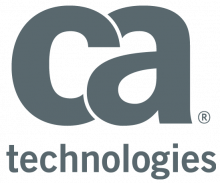
- CountrySpain
- WebsiteLink
- AcronymCA
CA Technologies Development Spain (CA) is a company of the group of CA Technologies. CA is a global Information Technology (IT) management software company and it is one of the largest independent software corporations in the world. CA applies decades of experience and innovation to research, develop and deliver software that integrates with other solutions to make an organization’s technology investments more valuable. The company supports software which runs in mainframe, distributed, virtualized and cloud environments and which a majority of the Forbes Global 2000 has installed. CA Labs was established in 2005 to strengthen relationships between research communities and CA Technologies. CA Labs leverages leading-edge research from universities around the world while serving as an innovation hub within the company. CA Labs engages with academia, professional associations, industry standards bodies, customers and partners to explore novel products and emerging technologies. The results of the projects established with these partners vary from research publications, to best practices, to new directions for products. CA Labs is established in different countries. CA Labs has been active for more than 8 years worldwide and the consortium will be working with researchers with more than 20 years of experience in the company. CA Labs will provide its research experience in managing very large data sets and general experience on doing industrial research.

